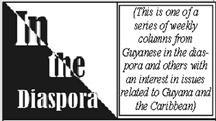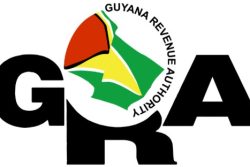
D. Alissa Trotz is editor of the
In the Diaspora Column
A little over a week ago, Guyanese woke up to what can only be described as a racist and xenophobic attack on Haitians in the Guyana Times newspaper. Titled “Influx of Haitians into Guyana raises major health concerns,” the article offers a classic example of racial profiling. Indeed a subtitle for this cowardly piece of journalism could have been: “Disease ridden Black people flooding our shores.” The article was written under the guise of thoughtfully addressing the issue of the arrival and treatment of Haitians in Guyana – certainly a legitimate question – whose numbers have increased following the institution of the Caricom recommendation of a six month visa on entry to Haitians. This was in fact a principle agreed upon under the free movement provisions of the Caribbean Single Market and Economy (CSME), which was first rolled out with skilled workers before a more general application of the rules, and which Haiti, even as a full member of Caricom, did not have access to until very recently. Following the humiliating treatment and deportation of Jamaican national Shanique Myrie from Barbados in 2011, the right of Caribbean nationals to free movement in the region was specified more precisely by the Caribbean Court of Justice ruling of 2013.
But the approach that the Guyana Times chose was to raise the spectre of a diseased Haitian population infecting defenseless Guyanese and overwhelming the public health system. It is scaremongering of the worst kind. How else is one to interpret the following statements: “Through interaction with Guyanese, it is expected that any communicable and non-communicable diseases will spread, raising questions as to the stability of the health sector to cushion increased cases of these illnesses. Moreover, an epidemic could prove deadly for the small population.” How different, one wonders, is this from the alleged response by US President Donald Trump in December 2017 that Haitians “all have AIDS?”
The Guyana Times piece was accompanied by another article on August 2, which reported PPP leader Bharrat Jagdeo as alleging “that the surge of immigrants and the ongoing House-to-House registration exercise are more than mere coincidence.” It would be followed by a letter on August 3rd to the same newspaper from Kit Nascimento that described “droves” of Haitians coming in an election year and asking for official clarification on this matter. The word droves brings to mind words like swarms, hordes, none of which is positive. One does not know where to begin in response to the Guyana Times’ take on what we might call the Haitian question. There is so much to say, from challenging the stated ‘facts’ that enable the Times to claim that Haitians are disease carriers, to confronting how these articles reflect what one person described as Guyana’s ethnic and racial insecurity which continues to be used to promote disturbing and at times hateful messages and propaganda.
The Guyana Times is peddling in dangerous waters, with a remarkably short memory. What the editors are irresponsibly and recklessly saying about Haitians has been said, in fact continues in some places to be said, about Guyanese. I have written elsewhere about an incident that occurred over a decade ago – July 19, 2005 – with a flight arriving in Barbados from Guyana. Scores of Guyanese never made it past what is dubbed “the Guyanese bench” at Grantley Adams airport, and were sent back to Guyana that evening. At the time, I decided to look at what was being said about Guyanese in the Barbadian printed press, soon amassing pages of newspaper columns, letters and editorials filled with vitriol against Guyanese. The xenophobic Guyana Times article would have been right at home here. As I noted, “words like flood and swamp suggested that Barbados was vulnerable and open to invading hordes…who threatened the country’s social equilibrium, notwithstanding statements by the Barbadian government that the numbers of Guyanese in the country could not support such a conclusion…images emerged of squatting and overcrowding (the dirty, anti-social Guyanese), of illegal access to scarce social services and free medical care (the duplicitous and greedy Guyanese), of threats to law and order (the criminal Guyanese), of a political imbalance, with at least one opposition politician speculating that the voters’ list could be artificially inflated (the cheating Guyanese), of immigrants accepting lower wages and undercutting Barbadian labour (the Guyanese scab). Indian-Guyanese were singled out as particularly incapable of integrating, and of threatening to import Guyana’s ‘ethnic’ problem into the island. In some of the online blogs that I also looked at, women were singled out as preying on unsuspecting Barbadian men in order to get themselves legalised (the immoral and sexually loose Guyanese).”
In a series of interviews done by women’s organization Red Thread, Guyanese women traders spoke about their experiences trying to move across the Caribbean during the economic crisis under the PNC dictatorship in the 1980s. As one woman put it, “I use to buy shoes in Barbados to sell here, but I stop going. Barbados don’t treat we good. I personally never get turn back but they turning people back every minute. I don’t know why. They say Guyanese going there too steady. Guyanese get treat worse in Barbados than Trinidad. In truth, Trinidad turn we back plenty too. What we going say? We go there to make a living because we cannot do anything here to make a living.”
Trinidadian-based Guyanese academic Gordon Rohlehr identifies the danger of a kind of nationalism in the region in which “the “Other became the other Caribbean person.” In other words, the kind of nationalism that threatened the sense that one could be, say, Jamaican and truly Caribbean at the same time. This was often expressed in popular culture; Rohlehr points to one Trinidadian calypso from the early 1940s titled ‘Small Island, Go Back Where you Really Come From’, and cites another by Blakey, Send Them Back, in which Grenadians are identified as outsiders by their inability to pronounce the word ‘box’ with an authentic Trinidadian accent.
But there are fatal and tragic consequences to this setting of borders. In 2010, Barbadian artist Annalee Davis designed an installation, titled Show Me Your Status, that revolved around a model of a Barbadian minibus built by Anderson Chase. The soundtrack offered the testimony of a woman about her experience of being confronted by the authorities randomly boarding minibuses looking for ‘illegals’: “You know I was very scared that this was happening to me so I take my bag and I’m looking for my ID card because sometimes I misplace my ID card and I’m taking a little while to look for it and she’s carrying on, you don’t have an ID card, get up and get off the bus miss, and you can see the anger in her eyes…And I say just hold on a minute, I’m looking for it and she says no just get up and step off the bus. Then I looked in another part of my bag and I eventually found it and I show her the ID card…Then the others proceed to the back of the bus, they came to these four ladies which was on the bus which is Guyanese, they told them to stand up and show them any status they have, paper or anything legal…And the lady say no they don’t have anything and the lady is carrying on and saying, well is time for you to get off this bus and on LIAT and back to Guyana. And the lady was crying because one lady have her daughter and the other lady was saying well she have her daughter at secondary school and if she go back who going take care of her daughter and she won’t know what is going on…I am married to a Barbadian, I have my ID card with citizen on it and it mark Barbadian which mean I am also Barbadian. Well, I was wondering …how they know to come straight direct to me and the other people on the bus. Well after the incident was over, some people on the bus was saying you can actually make $50 by calling immigration and informing about illegal immigration. When I get on the bus now I don’t want to speak to anybody on the bus because I’m afraid they going find out my accent when they hear me speak.”
This is the sentiment that the Guyana Times article helps to produce.
Across the Caribbean Sea, 1937 was the year in which thousands of Haitian women, children and men were massacred in the borderlands of the Dominican Republic, on the orders of the dictatorial Rafael Trujillo regime. The final section of Edwidge Danticat’s Farming of the Bones recalls that whether one was slaughtered or left to live turned on one’s ability to pronounce the herb parsley – a herb with rich ritual use in Haitian culture – with a Dominican Spanish accent (as opposed to one inflected by Haitian Kreyol), in which, as Danticat writes, the attackers listened for “the trill of the r or the precision of the j” as signs of the authentic native speaker, fluent in the mother tongue.”
These are the consequences of xenophobia, the kind produced in the pages of the Guyana Times.
Even more recently, we need look no further than the killings that just took place in El Paso, Texas, on the US-Mexican border, in which the shooter reportedly told the police that he was targeting Mexicans. This is against a backdrop in which the Commander in Chief and holder of the highest office in the United States has spoken regularly about an immigrant “invasion” and has described Mexicans as gang members, rapists and murderers.
This is the sandbox that the Guyana Times article is playing in.
The Caribbean is a space of movement and migration. As Guyanese we know this only too well – wherever you don’t need a visa, you will find us showing up. And for a while, along with Dominica, we were one of the few countries in the world with a negative population growth rate. Plus most of us who live on the coast are descendants of enslaved Africans and indentured Indians. It is we coastlanders who produce this xenophobia, who carry on as if the country is ours and ours alone. We might do well to remember that even brought under duress, we are immigrants who have made this region our home, at the continuing expense of the indigenous peoples who travelled and tended these spaces and lands long before our painful arrival.
What a piece of arrogance from the Guyana Times. As Akola Thompson wrote in a column last week, xenophobia is not patriotism. Nor does patriotism need to be at the expense of understanding ourselves to be part of a wider region, Latin American and Caribbean.
In 2008, Trinidadian calypsonian David Rudder came out with his hit song, Haiti I’m Sorry. The chorus goes like this:
Haiti I’m sorry
We misunderstood you
But one day we’ll turn our heads
And look inside you,
Haiti I’m sorry,.. Haiti I’m sorry
One day we’ll turn our heads and
Restore your glory.
The Guyana Times owes Haitians, Caribbean people, and Guyanese, an unconditional retraction and apology in its pages. One can no longer find the article through an online search – that’s the work of cowardice, either keep it up and defend it or take it down and retract it – but this has been the only response, save for a defensive op ed or two since then rejecting allegations of racism. The newspaper’s continuing failure, indeed its refusal to take accountability for the manner in which it raised the issue of Haitians in Guyana, speaks volumes. But it does not speak for Guyanese. It can never be in our names.






